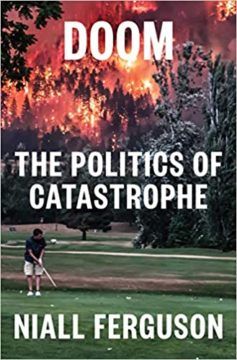Jared Marcel Pollen in Quillette:
 Niall Ferguson’s new book, Doom: The Politics of Catastrophe, shows us through a tapestry of disasters just how entwined we are with our volatile environment, and serves us a biting and inconvenient thesis: that many disasters, even those dubbed “natural,” are to some extent the result of human error. “It is tempting but misleading,” Ferguson writes, “to divide disasters into natural and man-made … a natural disaster is a disaster in terms of human lives lost only to the extent of its direct or indirect impact on human settlements.” Disasters, in other words, are disasters not simply because they occur, but because of whom they affect, because they strike and destabilize systems.
Niall Ferguson’s new book, Doom: The Politics of Catastrophe, shows us through a tapestry of disasters just how entwined we are with our volatile environment, and serves us a biting and inconvenient thesis: that many disasters, even those dubbed “natural,” are to some extent the result of human error. “It is tempting but misleading,” Ferguson writes, “to divide disasters into natural and man-made … a natural disaster is a disaster in terms of human lives lost only to the extent of its direct or indirect impact on human settlements.” Disasters, in other words, are disasters not simply because they occur, but because of whom they affect, because they strike and destabilize systems.
The zoology of catastrophe is as follows: “Gray Rhinos” (things we can see coming), “Black Swans” (defined by Nassim Taleb as things that “seem to us, on the basis of our limited experience, to be impossible”) and “Dragon Kings” (vast disasters that lie outside normal power law distributions). The history of disasters, Ferguson writes, is the “poorly managed zoo” of these creatures, “as well as a great many unfortunate but inconsequential events and an infinity of nonevents.”
More here.
